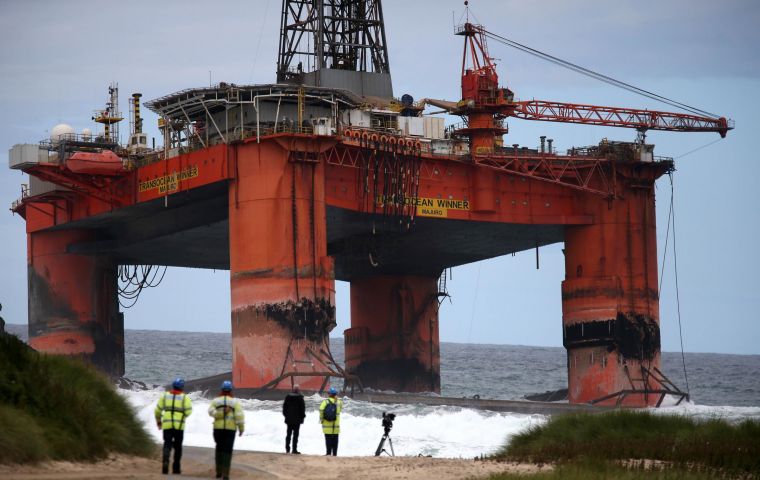MercoPress. South Atlantic News Agency
Huge volumes of discovered hydrocarbons remain 'stranded' in South Atlantic fields of Brazil, Angola and Falklands
 These volumes, which cost an estimated US$ 24bn to discover and with a combined value of US$ 65bn, account for 40% of reserves proven in high-impact discoveries
These volumes, which cost an estimated US$ 24bn to discover and with a combined value of US$ 65bn, account for 40% of reserves proven in high-impact discoveries Huge volumes of discovered hydrocarbons worldwide are currently ‘stranded,’ according to a study by Westwood Global Energy Group. The consultant has identified 119 fields in this category that were found between 2008 and 2016 with collectively 11 Bbbl of oil and 36 Bboe of gas, but currently not progressing toward development, including Brazil, Angola, and the Falkland Islands in the south Atlantic.
These volumes, which cost an estimated US$ 24 billion to discover and with a combined value of US$ 65 billion [1], account for 40% of the reserves proven in high-impact discoveries in this period.
Westwood’s analysis shows the highest volume of ‘stalled’ gas is in the Ruvuma-Rufiji basin offshore Mozambique and Tanzania where 166 tcf was proven between 2010 and 2015, and yet only 38 tcf has shown any sign of progression.
Brazil has the largest stalled oil/condensate resource, with 3.8 Bbbl spread across 19 high-impact finds in five geological basins.
Elsewhere, 3 Bboe of oil and gas remains in the subsurface across Angola’s Kwanza and Lower Congo basins; 14 tcf of discovered gas is untouched in the Browse and Carnarvon basins off Western Australia; and more than 500 MMboe are stalled in each of Nigeria, Malaysia, Gabon, Vietnam, Romania, Cyprus, Canada, the Falkland Islands, and the US.
According to the consultant, there are 26 different contributing factors to this state of affairs. The main impediments are fiscal regime/gas terms in the host country, along with access to finance and portfolio prioritization.
Subsurface factors include fluid composition, reservoir quality, and compartmentalization.
Offshore Tanzania, 14 deepwater gas discoveries clustered in five potential developments are going nowhere due to protracted negotiations with the government on gas terms, and more compartmentalized reservoirs than off Mozambique to the south – with lower resource densities and higher development costs.
In the Santos basin off Brazil, six discoveries are affected by subsurface issues. Petrobras’ Jupiter, for instance, has large volumes of associated CO2, although new CO2 handling technologies are undergoing testing the Mero field in the Libra block.
Graeme Bagley, head of Global Exploration & Appraisal at Westwood, also cited the pre-salt Dolomita Sul, Bigua and Bem-Te-Vi discoveries, all smaller than the average in the play due to a lesser trap size and low reservoir quality. Petrobras has since relinquished these fields.
In the Kwanza basin, the discovered hydrocarbons contain ~50% gas and operators have only been granted rights to the gas since 2018 under production-sharing agreements. Various actions could be taken to reduce the backlog of stranded fields, Bagley suggested.
1.) Appraisal drilling to unlock upside: 46 of the stalled discoveries have yet to be appraised, and stalled discoveries not so far declared commercial have fewer E & A penetrations on average than fields where final investment decision have been taken, compared to fields which have received FID. Additional subsurface data from appraisal drilling could deliver upside potential.
2.) Ten discoveries with 2.5 Bboe of resources are stalled due to subsurface challenges, but some of these could be addressed through new ultra-HP/HT well completions, notably in the Paleogene plays of the northern Gulf of Mexico.
[1] Assuming US$ 1.2/boe for gas and US$2 /bbl for oil




Top Comments
Disclaimer & comment rules-

-

Read all commentsSounds like many of the 26 reasons result from the peculiarity of hydrocarbon demand/price relationship. It is somewhat surprising to learn that hydrocarbons appear to contradict the conventional demand / supply / price rules of traditional economic theory. When hydrocarbon market prices rise and exceed certain benchmark levels, due to tightened supply, the availability actually might rise, because previously cost-prohibitive extraction and production now become economically profitable, thereby bringing on stream large amounts of hitherto excluded supply. Such is the case with shallow heavy oils requiring steam stimulation, low permeability ('tight') oil and gas reserves brought on line with costly fracking and deep water production at high development cost.
Oct 28th, 2020 - 04:27 pm 0Take your hands off of Argentinean oil reserves. We all know this was the big reason for invading our islands
Nov 05th, 2020 - 08:08 pm 0Commenting for this story is now closed.
If you have a Facebook account, become a fan and comment on our Facebook Page!